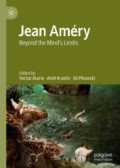Abstract
Based on his own experience, Jean Améry (At the Mind’s Limits, 1980) argued that torture is “the most horrible event a human being can retain within himself” (p. 22). This paper, relying largely on Améry’s own words, investigates this statement and seeks to provide it with a more concrete basis in phenomenology and embodied cognition. In particular, it demonstrates that torture destroys the most basic structure of the human being.
I would like to thank Shaun Gallagher and Eli Pitcovski for their helpful comments on earlier drafts.
Access this chapter
Tax calculation will be finalised at checkout
Purchases are for personal use only
Notes
- 1.
For the sake of the argument, let us assume that such cases exist.
- 2.
The discussion uses the masculine form because it is based on Améry’s writings and experiences.
References
Améry, J. (1980). At the Mind’s Limits (S. Rosenfeld & S. P. Rosenfeld, Trans.). Bloomington: Indiana University Press.
Antelme, R. (1992). The Human Race (J. Haight & A. Mahler, Trans.). Marlboro: Marlboro Press.
Arieli, A., & Ataria, Y. (2018). Helplessness: The Inability to Know-That You Don’t Know-How. Philosophical Psychology, 31, 1–18.
Ataria, Y. (2015a). Dissociation During Trauma: The Ownership-Agency Tradeoff Model. Phenomenology and the Cognitive Sciences, 14(4), 1037–1053. https://doi.org/10.1007/s11097-014-9392-9.
Ataria, Y. (2015b). Trauma from an Enactive Perspective: The Collapse of the Knowing-How Structure. Adaptive Behavior, 23(3), 143–154. https://doi.org/10.1177/1059712314578542.
Ataria, Y. (2015c). Sense of Ownership and Sense of Agency During Trauma. Phenomenology and the Cognitive Sciences, 14(1), 199–212. https://doi.org/10.1007/s11097-013-9334-y.
Ataria, Y. (2016a). I Am Not My Body, This Is Not My Body. Human Studies, 39(2), 217–229. https://doi.org/10.1007/s10746-015-9366-0.
Ataria, Y. (2016b). When the Body Becomes the Enemy: Disownership Toward the Body. Philosophy, Psychiatry & Psychology, 23(1), 1–15. https://doi.org/10.1353/ppp.2016.0002.
Ataria, Y. (2017). The Structural Trauma of Western Culture: Toward the End of Humanity. New York: Palgrave Macmillan.
Ataria, Y. (2018). Body Disownership in Complex Post-Traumatic Stress Disorder. New York: Palgrave Macmillan.
Ataria, Y. (2019a). Becoming Nonhuman: The Case Study of the Gulag. Genealogy, 3(2), 27.
Ataria, Y. (2019b). When the Body Stands in the Way – Complex Posttraumatic Stress Disorder, Depersonalization and Schizophrenia. Philosophy, Psychiatry, & Psychology, 26, 19–31.
Ataria, Y., & Gallagher, S. (2015). Somatic Apathy: Body Disownership in the Context of Torture. Journal of Phenomenological Psychology, 46(1), 105–122. https://doi.org/10.1163/15691624-12341286.
Ataria, Y., & Somer, E. (2013). Total Otherness in Dissociative Identity Disorder. Journal for Otherness, 4(1), 1–25.
Benjamin, W. (1969). Theses on the Philosophy of History. In H. Arendt & H. Zohn (Eds.), Illuminations. New York: Schocken.
Dorfman, E. (2014). Foundations of the Everyday: Shock, Deferral, Repetition. London, New York: Rowman & Littlefield International.
Dreyfus, H. L. (1991). Being-in-the-World: A Commentary on Heidegger’s Being and Time, Division I. Massachusetts and London: MIT Press.
Dreyfus, H. L. (1992). What Computers Still Can’t Do: A Critique of Artificial Reason. Cambridge, MA and London: MIT Press.
Dreyfus, H. L. (2017). Background Practices. Oxford: Oxford University Press.
Fuchs, T., & Schlimme, J. E. (2009). Embodiment and Psychopathology: A Phenomenological Perspective. Current Opinion in Psychiatry, 22(6), 570–575. https://doi.org/10.1097/YCO.0b013e3283318e5c.
Gallagher, S., & Lindgren, R. (2015). Enactive Metaphors: Learning Through Full-Body Engagement. Educational Psychology Review, 27(3), 391–404. https://doi.org/10.1007/s10648-015-9327-1.
Gibson, J. (1979). The Ecological Approach to Visual Perception. Hillsdale, New Jersey: Lawrence Erlbaum Associates.
Gibson, J. (1982). Reasons for Realism: Selected Essays of James J. Gibson (E. Reed & R. Jones, Eds.). Hillsdale, NJ: Lawrence Erlbaum.
Heidegger, M. (1996). Being and Time (J. Stambaugh, Trans.). Albany: New York Press.
Heidelberger-Leonard, I. (2010). The Philosopher of Auschwitz. London and New York: IB Tauris.
Kafka, F. (2007). In the Penal Colony. In Kafka’s Selected Stories, Norton Critical Edition (S. Corngold, Trans., pp. 35–59). New York: Norton.
Leder, D. (1990). The Absent Body. Chicago: The University of Chicago Press.
Levi, P. (1959). If This Is a Man (S. Woolf, Trans.). New York: The Orion Press.
Levinas, E. (2006). Humanism of the Other (N. Poller, Trans.). Urbana; Chicago: University of Illinois Press.
Merleau-Ponty, M. (1968). The Visible and the Invisible (C. Lefort, Ed., & A. Lingis, Trans.). Evanston: Northwestern University Press.
Merleau-Ponty, M. (2002). Phenomenology of Perception (C. Smith, Trans.). London: Routledge and Kegan Paul.
Ratcliffe, M. (2008). Feelings of Being. Oxford: Oxford University Press.
Ratcliffe, M. (2015). Experiences of Depression. Oxford: Oxford University Press.
Sartre, J.-P. (1956). Being and Nothingness (H. Barnes, Trans.). New York: Philosophical Library.
Schilder, P. (1935). The Image and Appearance of the Human Body. New York: International Universities Press.
Semprún, J. (1998). Literature or Life (L. Coverdale, Trans.). New York, NY: Penguin Books.
Author information
Authors and Affiliations
Editor information
Editors and Affiliations
Rights and permissions
Copyright information
© 2019 The Author(s)
About this chapter
Cite this chapter
Ataria, Y. (2019). Total Destruction: The Case of Jean Améry. In: Ataria, Y., Kravitz, A., Pitcovski, E. (eds) Jean Améry. Palgrave Macmillan, Cham. https://doi.org/10.1007/978-3-030-28095-6_8
Download citation
DOI: https://doi.org/10.1007/978-3-030-28095-6_8
Published:
Publisher Name: Palgrave Macmillan, Cham
Print ISBN: 978-3-030-28094-9
Online ISBN: 978-3-030-28095-6
eBook Packages: Behavioral Science and PsychologyBehavioral Science and Psychology (R0)

